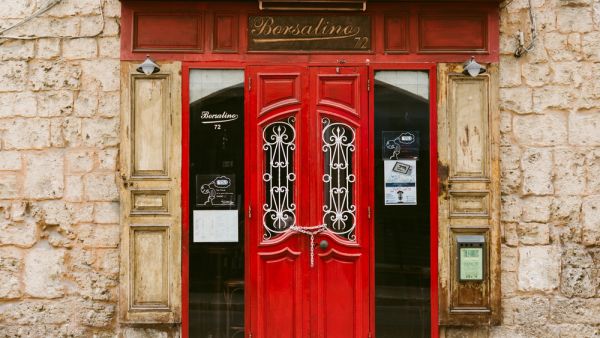On Mar Mikhael’s Armenia Street, once famed for its ability to buzz any day of the week, the scene is eerie.
The area was one of the worst hit by the devastating Aug. 4 blast at Beirut Port, and subsequently, the bars and restaurants that defined the district have been struggling to replicate the jubilant atmosphere of the past. On top of this, the caretaker government’s coronavirus regulations targeting bars and nightclubs in the city have added insult to injury to an already fatigued sector.
Since Oct. 11, nightclubs and bars have been ordered to shut and restaurants to operate at a 50 percent capacity only. This is as well as the 1-6 a.m. curfew that has been in place since September. Despite these precautions and the government imposing localized lockdowns on 169 villages and towns last week, the number of daily cases has consistently remained over 1,000 in the past 14 days.
But some beleaguered bar owners have defied the ruling and continued serving, causing upset to those whose bars are shut and are subsequently losing income. Tro Djeridian, owner of London Bar on Armenia Street, told The Daily Star that he had abided by the regulations and shut his bar. That was until friends and loyal customers contacted him reporting that bars in other areas of Beirut, notably Hamra and Badaro, had remained open.
Speaking to The Daily Star at his bar, Djeridian explained: “It was very sad when I heard the police weren’t intervening in the bars open in Hamra and Badaro. I was just sitting at home, no income, no rent – it’s not fair.” It led Djeridian to call up the Tourism Ministry himself to check the rules still applied, and also report the rumors of bars still serving. But according to Djeridian, the ministry’s response was nonchalant and disappointing.
So much so that he decided Tuesday to reopen his bar on Armenia Street. London Bar is accredited with a tearoom license rather than a bar, frequent among outlets in the country. “So, I’m going to use this [the license] as an excuse” Djeridian disclosed, in case of any visit or fine from the police.
However, some businesses have a personal connection to the state, known as “wasta” – a system of cronyism and favoritism. It allows businesses to operate, legally or not. For Djeridian, the unfair system is what spurned him to disregard the measures, because the police are not “abiding to every bar” he said. While Djeridian spoke to The Daily Star, two policemen strolled past his bar, making no intervention at the clear breach in regulation.
On the other side of town, Andre Malak, owner of Rabbit Hole in Hamra, told The Daily Star how his bar has been closed since the regulation was enforced. Until then, they had been ensuring customers kept their distance. We removed chairs from the bar and did temperature checks at the door,” Malak said. Yet, after The Daily Star’s investigation, Rabbit Hole reopened Thursday, serving customers until 1 a.m., although with social-distancing guidelines imposed.
Riwaq, a venue in Geitawi, is an example of a late-night venue operating within the guidelines. It is a bar, restaurant, co-working and events space.
Speaking to The Daily Star, Hussein Farran, one of three partners of the venue, expressed his disdain for the rule: “It is a stupid rule. Corona is not going from bars; people are not getting infected.”
Within the bar, they have made appropriate changes, like removing tables to make space and enforcing masks inside. But even so, it has not made them exempt from police visits.
“Police came the other day and told us to close before the curfew. They have visited us a few times to close us down,” Farran said.
Even after curfew hours, some bars in the city are allegedly still operating. Last weekend, a Daily Star reporter was invited to enter a bar through a discreet window on the side of the building and found the space dimly lit and full of late-night revellers.
For Dany Aprat, who runs bars and restaurants in Beirut, the responsibility for coronavirus is no longer with the government but the people. Speaking to The Daily Star, Aprat said of the rules: “It is a shared responsibility. The citizens should start respecting the guidelines ... the government cannot always impose.” He expressed frustration at the policy and its incompatibility with business, but admitted that “regulations will not stop until they have found a vaccine.”
Owners in Mar Mikhael who are dealing with destroyed venues from the explosion have had to consider whether it is worth reopening in the area. Aprat, who owns Locale on Armenia Street which has been closed for three months dealing with repairs, said: “I think there is [still] business in Mar Mikhael, but it will need some time to pick up again.”
A similar sentiment is felt by Karine Khoury, co-owner of holding company Partner in Disruptive Entertainment. which owns two bars and three restaurants in Mar Mikhael. She told The Daily Star, that “people might not be in the mood for a drink where such tragedy happened,” but added, “We really want it to get back [to how it was before].”
Bar owners have had to deal with a lethal dose of disruption from the events of the past year, and are frustrated at the government’s lack of consistency with shutting venues down. As Djeridian said, “Regulations will work if they are properly enforced, but nothing is being respected, everyone is out.”
When asked what his solution would be to defeating the virus, he suggested a full country lockdown. “It is probably the only way to get rid of the virus, but do it right and do it once and for all.”
This article has been adapted from its original source.








